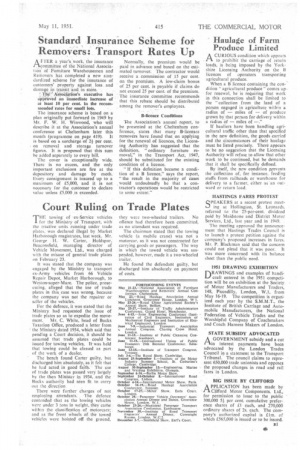Court Ruling on Trade Plates T HE towing of ex-Service vehicles
Page 35

If you've noticed an error in this article please click here to report it so we can fix it.
for the Ministry of Transport, with the tractive units running under trade plates, was declared illegal by Market Harborough magistrates, last week. Mr. Ceorge 11. W. Carter, Holdspur, Beaconsfield, managing director of Vehicle Movement, LW., was charged with the misuse of general trade plates on February 23.
It was stated that the company was engaged by the Ministry to transport ex-Army vehicles from 66 Vehicle Repair Depot, Market Harborough, to Weston-super-Mare. The police, prosecuting, alleged that the use of trade plates in this case was wrong, because. the company was not the repairer or seller of the vehicles.
For the defence, it was stated that the Ministry had requested the issue of trade plates so as to expedite the movement. Mr. C. White, head of Bucks Taxation Office, produced a letter from the Ministry dated 1934, which said that pending a Court decision, it should be assumed that trade plates could be issued for towing vehicles. It was held that towing could be classed as part of the work of a dealer.
The bench found Carter guilty, but discharged him absolutely, as it felt that he had acted, in good faith. The use of trade plates was passed very largely by the then Minister in 1934, and the Bucks authority had seen fit to carry out the direction.
There There were further charges of not employing attendants.. The defence contended that as the towing vehicles were under 3 tons in weight, they came within the classification of motorcars; and as the front wheels of the towed vehicles were hoisted off the ground, they wee two-wheeled trailers. No offence had therefore been committed, as no attendant was required.
The chairman stated that the towing vehicle (a mobile crane) was not a motorcar, as it was not constructed for carrying goods or passengers. The way in which the towed vehicle was suspended, however, made it a two-wheeled trailer.
He found the defendant guilty, but discharged him absolutely on payment of costs.




























































































